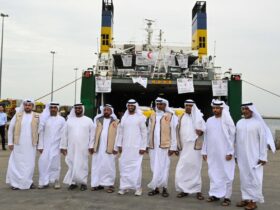Dubai – Masaader News
Saudi Arabia carried out a record number of reforms during the past year to improve the business climate for small and medium enterprises, says the World Bank Group’s latest Doing Business 2018: Reforming to Create Jobs report.
With six reforms, Saudi Arabia carried the largest number of reforms in the Middle East and North Africa region. The reforms covered most areas included in the report. Saudi Arabia increased its DTF score by 2.93, which is significantly higher than the 0.38 average increase among high income economies. Saudi Arabia has the second best improvement in DTF score among high income economies after Brunei Darussalam (+5.77).
“Such strong progress in just one year is testimony to the commitment of the Government in improving the Kingdom’s investment climate. The well-orchestrated and coordinated efforts amongst various Government agencies should send a strong signal to investors interested in investing in the Kingdom,” said Nadir Mohammed, World Bank’s Country Director for Saudi Arabia.
Marking its 15th anniversary, the Doing Business report notes that Saudi Arabia has implemented 30 reforms since 2003, with the majority of reforms focused on Starting a Business (seven), followed by Registering Property (five) and Getting Credit (four). As a result, today it takes an average of 18 days to start a business in Riyadh, compared to 81.5 days 15 years ago.
The reforms implemented in the past year in Saudi Arabia are:
Starting a Business was made easier through the introduction of an online system that merges name reservation and the submission of the articles of association into one procedure. The online payment system was also improved, removing the need to pay fees in person.
In Registering Property, the efficiency of the land administration system was improved by implementing an online platform to check for ownership and encumbrances and by streamlining the property registration process. Additionally, Saudi Arabia made registering property easier by improving the land administration system’s dispute resolution mechanisms. As a result, it takes only 1.5 days to transfer property, at no cost.
Minority investor protections were strengthened by increasing shareholder rights and role in major decisions, clarifying ownership and control structures, requiring greater corporate transparency and regulating the disclosure of transactions with interested parties.
Paying Taxes was simplified by improving the online platform for filing and paying taxes, which reduced the number of hours needed to pay taxes from 67 to 47.
In Trading Across Borders, the time for documentary compliance for exports and imports was shortened by reducing the number of documents required for customs clearance, which decreased the time for documentary compliance by nine days for both exports (from 90 hours to 81 hours) and imports (from 131 hours to 122 hours).
Enforcing Contracts was made easier by introducing an electronic case management system for the use of judges and lawyers.
“The reforms of the past year are extremely comprehensive, covering six of the 10 Doing Business areas that feed into the rankings. Such a strong momentum, if continued in the coming years, will be transformational to the business climate in Saudi Arabia,” said Rita Ramalho, Acting Director of the World Bank’s Global Indicators Group, which produces the report.
Saudi Arabia performs well in the areas of Protecting Minority Investors, where it ranks 10 globally, Registering Property (24) and Dealing with Construction Permits (38). For example, Saudi Arabia receives a score of 7 out of 10 points on the extent of conflict of interest regulation index, which is significantly higher than the regional average of 4.9 points and higher than the average of 6.4 points of OECD high-income economies. In addition, it only takes 1.5 days to register a property in Riyadh, compared to the average of 22 days in OECD high-income economies.
However, Saudi Arabia lags in areas such as Trading Across Borders, and Resolving Insolvency. For example, in Trading Across Borders, border compliance for imports takes 228 hours, compared to just nine hours on average in OECD high-income economies.
Focus Keywords
#Dubai Masaader News #Saudi Arabia #Business Masaader News #Doing Business 2018











